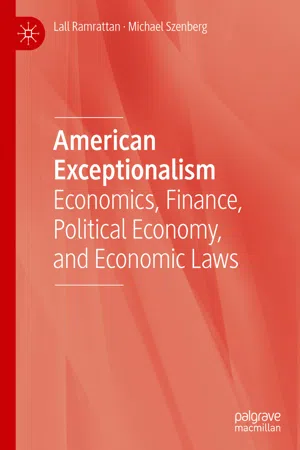An attempt to define the term American Exceptionalism revealed a family of meanings: “Exceptionalism may refer to the idea that there is (a) something different about America or (b) something special about America. ‘Different’ is the predominant meaning embraced by descriptive social science … ‘Special’ means different in a certain way … the possession of a certain quality or … the embrace of a task or mission” (Ceaser 2012, pp. 6–7).
Different and special characteristics allow us to analyze American Exceptionalism in absolute and relative terms. In the former, we can focus on structural aspects, looking at the merits of America as a new nation founded on a Revolution, and the nation with the most modern democracy (Samuelson 1977, Volume 4, p. 572). In the latter, we can focus on performance and conduct aspects of America in regard to national interest, at home and abroad.
The idea of American Exceptionalism can be traced back to Alexis de Tocqueville’s Democracy in America (1835) (Tocqueville 1963 [1835], Volumes 1–2). Tocqueville, after a nine-month exploration of American society, noted elements that distinguished it from other societies, including individualism, a focus on idea over form, the separation of church and state, people coming together by interest and not ideas, and freedom. He wrote that Americans “have a philosophical method common to the whole people” (Tocqueville 1963 [1835], Volume 2, p. 3). They have a “taste for physical gratifications,” desire “the shortest cut to happiness,” and “equality of conditions” (Ibid., pp. 136–138).
From a historic perspective, a popular interpretation of Tocqueville’s view is that “the United States, the lone successful democracy of his time, differed from all the European nations in lacking a feudal past and in being more socially egalitarian, more meritocratic, more individualistic, more rights-oriented, and more religious” (Lipset 2000, p. 32). Others have viewed US democracy from a procedural viewpoint—practices and institutions, deliberative—preferences, and substantive—necessary and sufficient viewpoints (Dahl et al. 2003, p. ix).
American Exceptionalism is forever in conflict with individualism, democratic despotism, and materialism (Schleifer 2012, p. 152). These conflicts are often viewed through the Jeffersonian trinity formula: life, liberty, and the pursuit of happiness. Resolution of conflicts is sought through the morals of the people and proper “checks and balances.” Some hold that Montesquieu’s (L’esprit Des Lois 1958) idea of “separation of power” is dominant, which postulates restraints to the abuse of power through the legislative, executive, and judiciary bodies, and not necessarily through natural rights or the threat of revolt. Today we tend to see exceptionalism as a dynamic concept that is continuously being challenged by the courses of economics, politics, wars, race relations, history, and culture.
We shall examine exceptionalism as it relates to democracy. The popular definition of democracy attributable to President Abraham Lincoln is that, “Democracy is the government of the people, by the people, for the people.” The historian John Lucas claims that democracy is also characterized by “rule of the majority,” which can degenerate into nationalism or populism. The argument is that “Majority rule is tempered by the legal assurance of the rights of minorities, and of individual men and women. And when this temperance is weak, or unenforced, or unpopular, then democracy is nothing more (or else) than populism. More precisely: then it is nationalist populism” (Lucas 2005, p. 5). Tocqueville also expressed some reservation on American democracy when he wrote that, “I am far from thinking that we ought to follow the example of the American democracy and copy the mean that it has employed to attain this end; for I am well aware of the influence which the nature of a country and its political antecedents exercise upon its political constitution; and I should regard it as a great misfortune for mankind if liberty were to exist all over the world under the same features” (Tocqueville 1963 [1835], Volume 1, pp. 329–330).
The idea of the “American dream,” meaning that individual initiatives can lead to material prosperity, had long been a metaphor for American Exceptionalism. This idea might be associated with religious influences and symbols. As a recent analyst puts it, “the colonization of New England was essentially a religious undertaking to establish a ‘City on the Hill,’ a ‘new Jerusalem’” (Tiryakian 1993, p. 46). More generally, the idea of America’s exceptionalism implies that the country is a symbol, a beacon to follow. Some have evoked the military power of the nation as the characteristic which makes America exceptional. While the strong military has been lauded for many large wars, the notion of an exceptional military may also be related to American involvement in many smaller, more controversial ones.
In the same vein, the terms “Americana” and “American Creed” surrogate for American Exceptionalism. Americana is used to refer to our icons: the Statue of Liberty, Harley Davidson motorcycles, or ideals such as “what is good for GM is good for the country.” We recall that the great free trade presidents, Ronald Reagan and G. W. Bush, protected Harley Davidson by tariffs and the American steel industry by temporary tariffs, respectively. President Barack Obama protected GM by restructuring it through bankruptcy. In some instances, the term “liberty” is explained as a core of the American Creed that is American political faith based on history and tradition (Congressional Record, 65th Congress, 2nd Session, April 13, 1918). According to Gunnar Myrdal, the creed includes how “the American thinks, talks, and acts under the influence of high national and Christian precepts” (Myrdal 1962, p. lxxi). We will have occasion to visit how he pits this against “the valuations on specific planes of individual and group living, where [there are] personal and local interests, economic, social, and sexual jealousies; considerations of community prestige and conformity; group prejudice against particular persons or types of people” (Ibid., p. lxxi).
Lucas also perceived that American Exceptionalism can be invoked by the Right and Left viewpoints, as in Republican and Democrat, respectively (Lucas 2005, pp. 17–18). We saw the Republican presentation manifested by President Reagan in t...
